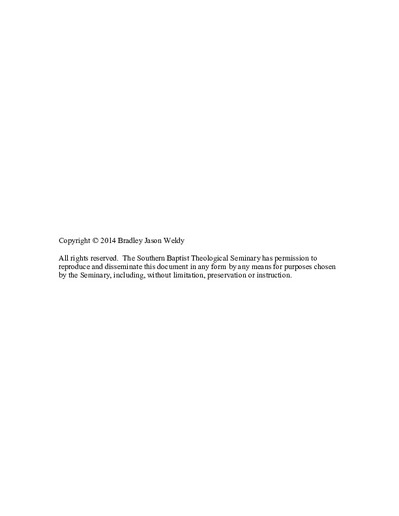| dc.description.abstract | This dissertation examines the influence and role of the Holy Spirit in the task of apologetics.
The first chapter recognizes the historical dearth of apologetic engagement dealing with the Spirit, and it lays out the need to intentionally correct this scarcity. This chapter in particular acknowledges that certain perspectives--Reformed, Anglican-Methodist, and charismatic--have already begun to reengaged the essential work of the Spirit in apologetics. And, finally, this chapter argues that various thinkers within these perspectives will shed light on developing a more robust Spirit apologetic.
Chapter 2 highlights the impetus for re-engaging the Spirit as he relates to apologetics Alvin Plantinga, and so-called Reformed Epistemology, have reintroduced a place for the Spirit in apologetics, focusing primarily on the experiential component of the internal instigation of the Holy Spirit, which operates as a special kind of cognitive equipment.
Chapter 3 discusses the Spirit and apologetics as relates to the Anglican-Methodist perspective. This chapter begins by connecting these two perspectives--Anglican and Methodist--into a fused perspective. Two key thinkers within this perspective--William Alston and William Abraham--are then examined for their contributions to the Spirit and his experiential deliverance of knowledge. The key part of this Spirit apologetic hones in on the perception or awareness of God .
Chapter 4 discusses the charismatic contribution to philosophy in general and the Spirit in particular. As the newest perspective to engage Spirit apologetics, the charismatic chapter begins with a justification for including this perspective in this project. This chapter also examines thinkers--like James K. A. Smith--as they isolate a Spirit apologetic more bent toward affective or emotional epistemic grounding.
Chapter 5 concludes this dissertation with a summary of these three perspectives. The Spirit is discussed briefly for his role as an apologist and evangelist, and a concise discussion is included concerning further areas of research and suggestive comments that may be drawn from the conclusions. In addition, this chapter offers a brief and evaluative discussion--based on observations from all perspectives--on the main trajectory of Spirit apologetics. | en_US |

